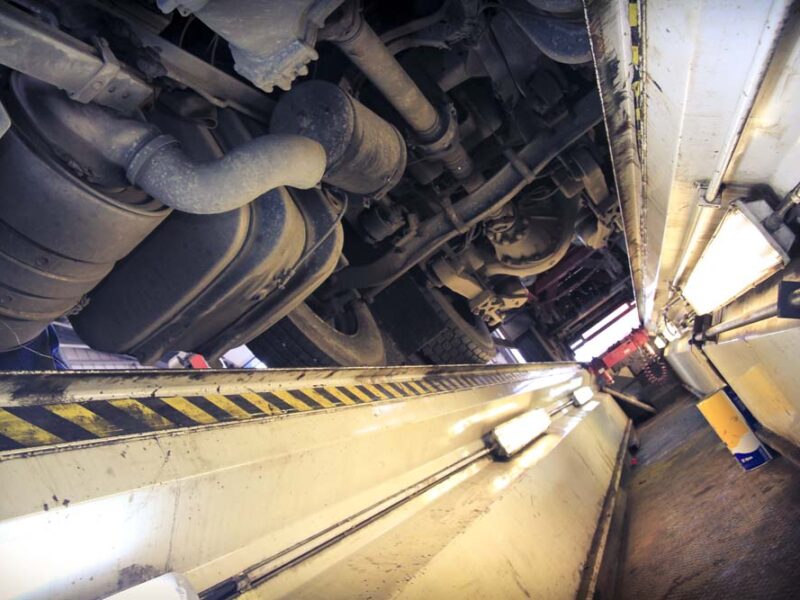Case Study - Public Inquiry for Gillbard Plant - Autumn 2024
Gillbard Plant, a company based in the Southwest of England that supplied plant machinery to the National Grid was called to a Public Inquiry in October 2024 by Traffic Commissioner, Mr. Kevin Rooney. Gillbard Plant is owned by Roger and Zena Gillbard. The case highlights many inadequacies in the maintenance regime of the company, but what made headlines in the industry press recently was the element of “DVSA Poacher turned Game-keeper” of Gillbard Plant’s Transport Manager, Mr Anthony Brayley-Willmetts, a former DVSA (VOSA) examiner turned transport consultant.
Overview:
The company was started in February 2020 with just two vehicles authorised on their standard national goods vehicle licence. By April 2022 the company had already received a call up to a public inquiry following an unsatisfactory outcome of a DVSA desk-based assessment. It was around this time that Mr. Brayley-Willmetts was appointed as a transport manager, with Zena Gillbard added as an additional TM in November of that year.
The call up to the most recent Public Inquiry in October 2024 was triggered by a DVSA investigation following reports in December 2023 that an unauthorised operating centre was being used. Both Mr. Brayley-Willmetts and Mrs Zena Gillbard were interviewed over the allegations, during which issues with a “general lack of process formality within the business” were also identified by the DVSA traffic enforcement officer Andrew Ball. There then followed a site visit in February 2024 by DVSA Vehicle Examiner Adrian Williams during which 6 of the 13 categories on his maintenance investigation visit report were noted as being ‘unsatisfactory’. There were a significant number of deficiencies with regard to the completion of the safety inspection reports, with many found to have had “driver-reportable defects” and several where the vehicle presented with apparently dangerous defects such as loose wheel nuts. During the fleet check, one vehicle was issued with an immediate prohibition for two tyre defects. Mr. Williams summary of the visit was that “the transport managers were not exercising proper control”.
At the public Inquiry the company decided not to engage legal representation for the hearing. Mr. Rooney asked the operator why, on its second public inquiry in two years there was no investment in legal representation, and was told that the company thought it was ‘unnecessary’. Pausing there, specialist legal representation will not ‘always’ be necessary or its cost proportionate in order to maximise an operator’s chances of achieving a “good result” however one might choose to define that term. But specialist road transport lawyers rarely, if ever, make things worse. What operators must always seek to avoid is spending money on non-specialist lawyers who do not know what they are doing!
Mr. Gillbard told the enquiry that they ran “two lorries to transport diggers to and from site”, the site being the National Grid operating centre on Bodmin Moor. The main work the company did for the National Grid was replacing poles between live wires. There were just three people involved in the business, Mr. Gillbard, Zena Gillbard and their appointed Transport Manager, Mr. Brayley-Willmetts. Zena Gillbard had only recently qualified as a Transport Manager so she was working as Mr. Brayley-Willmetts’ subordinate focusing mainly on the administration aspects of the TM’s job and Mr. Brayley-Willmetts “made sure she was doing it correctly”.
The Traffic Commissioner noted that no attempt had been made by the company to up load documents to the case matter and that the company had made no response to the call up letter. Mr. Brayley-Willmetts stated that he had uploaded “everything somewhere” but he could not advise the Traffic Commissioner of where and the Traffic Commissioner, upon looking at the audit function of the case management software, could see that no attempt to log in or update had been made by anyone from Gillbard Plant.
The small number of hard copy documents brought along to the Public Inquiry by Gillbard Plant showed PMI reports from 10th May and 15th June. When the Traffic Commissioner questioned the owners and the Transport Manager as to why the PMI report immediately before the MOT had a great many more defects than all those leading up to the MOT, no one was able to provide an answer. Ms Gillbard admitted to not having any mechanical knowledge, so she had to “trust what she was told by the staff at Pannell Commercials”, who undertook the maintenance of the two vehicles for Gillbard Plant. Ms Gillbard did not even know what qualifications Pannell Commercials held.
The Public Inquiry reviewed many infringements on brake testing and tyre pressures. There was one defect noted by the DVSA examiner that showed a 56% service brake imbalance on a front axle that had not been noted by the driver. The company did not carry out any gate checks on the vehicles, and although Ms Gillbard stated that gate checks had been instigated by the time of the public inquiry and were being carried out by her, she admitted that she had not in fact had any training on conducting inspections.
However, it was Mr. Brayley-Willmetts who comes in for the most significant criticism by the Traffic Commissioner.
Mr. Brayley-Willmetts background was in the transport industry. He started as a workshop manager and then moved to be fleet engineer for Somerset County Council for 14 years, before taking on a job at the DVSA (or VOSA as it was called at the time) on testing, roadside and training, something he did for 12 years. After he retired, he initially set up a consultancy business with a partner but was now working as an external transport manager for Gillbard Plant and Somerset Minibuses. When questioned on the maintenance failings discovered by the DVSA examiner, Mr. Brayley-Willmetts stated that he had told Pannells to “up their game on this” but that problems had continued and that they were “planning to hold a further meeting with Pannells”. This resulted in a sharp retort from the Traffic Commissioner who put it to Mr. Brayley-Willmetts that “a brake defect was not something that you discussed at some point in the future but one which should be rectified before the vehicle returns to service; it should be addressed in hours not months”.
The Traffic Commissioner Findings:
The Traffic Commissioner found the finances of the company to be satisfactory. On the matter of the unauthorised use of the National Grid Operating Centre, the fact that an application to include it on the O Licence for the company, once prompted to do so by the DVSA Traffic Enforcement Manager Mr. Ball, was accepted. On the tyre defects the finding of the Vehicle Examiner, Mr. Williams was upheld. The Traffic Commissioner found that the more serious of these adverse findings were as a result of “poor transport management” rather than a direct failing of the operator, “notwithstanding that every operator is expected to maintain oversight over their transport manager”. The Traffic Commissioner decided therefore that the shortcomings did not require him to “interfere with the business” and that a suspension would likely cause the business to fail.
He then turned to the Transport Managers. The TC states that the “operator trusted Mr. Brayley-Willmetts to upload their compliance documentation” which he failed to do. The Traffic Commissioner found “as fleet engineer for Somerset Council and with his background in the DVSA (or VOSA as it was known at the time) the issues identified by the Vehicle Examiner are basic and fundamental” and “ones that a DVSA inspection should not be finding on a 2-vehicle licence where he had been transport manager since February 2022”. The Traffic Commissioner therefore found that “in this operation the traffic matters have been the responsibility of Ms. Gillbard and the roadworthiness matters the responsibility of Mr. Brayley-Willmetts. The roadworthiness matters are far from where they should be. Mr. Brayley-Willmetts has not exercised the most basic of control, seeking instead to rely on DVSA to identify shortcomings that he will then discuss with the maintenance provider, when he gets round to it some weeks or months in the future”.
Traffic Commissioner Decisions:
Not surprisingly, the Traffic Commissioner found that Mr. Brayley-Willmetts had forfeited his good repute as a Transport Manager and disqualified him from acting as such for a period of one year and until he sits and passes again the transport manager certificate of professional competence.
In the matter of Zena Gillbard her lack of experience and knowledge of transport matters whilst noted as being wholly inadequate for the role that she took on was mitigated by her being subordinate to Mr. Brayley-Willmetts and dependent on his advice. Her repute as a Transport Manager was therefore marked as ‘tarnished’, but not lost.
The operator itself was issued with a clear and strong warning of the need to ensure full compliance in the future and to act immediately to resolve the shortcomings within its maintenance provider or to change providers. The fact that the O Licence was not revoked resulted in the company being able to continue trading.
Morale of the Tale?
It is clear that employing inexperienced people in a role such as a Transport Manager is a recipe for trouble. Ms. Gillbard may well have sat the qualification and passed, but it is clear from the decision notes that she was incapable of spotting a defect on a vehicle and whilst undertaking the administration part of a Transport Managers role adequately had little understanding of what this critical role she had taken on actually entailed.
Similarly, allowing Mr. Brayley-Willmetts un-supervised control over the transport management and trusting that he was doing things correctly without any oversight is a deep trap that many operators find themselves falling into. The owners of a transport businesses cannot delegate their responsibilities of traffic and roadworthiness management to an external Transport Consultant and leave everything up to the ‘TM’. What is required is constant supervision and vigilance on the part of the Statutory Directors.
The company escaped further sanction, such as a suspension of its licence by the ‘skin of their teeth’. Not (to use Mr. Rooney’s phrase) “investing” in legal representation for the tribunal showed a distinct lack of strategic foresight by the company. “Don’t spoil the ship for a ha’pworth of tar” is a reminder that one should not try to save money on things like legal representation when what is at stake is the life force of your business – your O Licence.
Getting the right legal advice when your business is threatened with a Public Inquiry is money invested into the business’s wellbeing and the right lawyer can add real value to the strategic running of the business as well as the tactical policies and procedures that should be in place to ensure compliance with the rules and regulations that govern the transport industry.
So, the morale of the tale? Do not be like Gillbard Plant! If you need help with your compliance or if you have received a call up to a Public Inquiry call us now on 01279 818280 or click here to send us an email. We are here to help.
© Richard Pelly, January 2025

Latest Coach & Bus Industry News and Insight

New Rules for Vehicle Operators and Drivers Carrying Out International Journeys
The Department for Transport and the Driver and Vehicle Standards Agency recently issued a bulletin regarding the new rules that vehicle operators and their drivers will have to comply with if travelling on international journeys…

Road Haulage Association Members and DVSA Leadership Work Shadow Each Other!
To help highlight the Road Haulage Association’s “National Lorry Week” which this year was between 4th and 8th November 2024, the Road Haulage Association and the DVSA’s Leadership team decided to spend some time work shadowing each other….

2024 Update to Guide to Maintaining Roadworthiness (GTMR)
The Guide to Maintaining Roadworthiness is the Driver & Vehicle Standard Agency’s (DVSA) standard produced in collaboration with key industry stake holders which explains the responsibilities and systems involved in maintaining vehicles in a roadworthy….

New Driver CPC Reforms to be in Force from 3rd December 2024
Following a very lengthy consultation period on this matter launched in early 2023, Parliament finally debated the “Vehicle Drivers (Certificates of Professional Competence) (Amendment) Regulations 2024” on Tuesday 29th October 2024…

When Sat Nav’s Lead Lorries Astray!
Lorries getting into trouble and causing chaos in the small country roads of Great Britain have been making headlines again. Whilst a lot of this content is amusing and no doubt is a winner with internet audiences there is a very serious side to these incidents…

Traffic Commissioners 2023-2024 Report – the Highlights & the Lowlights of the Year
In early October the Traffic Commissioners of Great Britain published their annual report. The report encompasses the purpose of the individual Traffic Commissioners who are independent regulators for the goods vehicle and public service vehicle industries and their professional drivers…

Vehicle Maintenance Data Collected by the DVSA
In a recent ‘blog’ by the DVSA’s Danny Charles the amount and type of data that the DVSA collects was discussed. Some may find it surprising how much data the DVSA holds and makes available to the general public on individual transport businesses…

Murky Mini-Bus Waters in UK?
There has been reports in the industry news concerning the number of illegal operators of mini bus services who are operating un-hindered by the regulatory enforcement agencies…

Driver CPC – Changes Coming in 2024 and 2025
The Driver Certificate of Professional Competence (DCPC) was introduced in the UK in 2007, as specified in EU Directive 2003/59/EC for all commercial drivers…

Driving in the UK? Read about the latest Rule Changes in 2024
Earlier this year various new driving laws were introduced, impacting both standard road users as well as HGV and PSV road users across England, Wales & Scotland. If you are driving in the UK, especially if you are a commercial driver, then you should ensure that you are aware of these amendments and new rules…

Are You Taking your Responsibilities to Maintain your Vehicles Seriously?
Running a haulage business is not an easy undertaking. There are a multitude of decisions to be made on a daily basis before any driver actually gets behind the wheel and delivers the goods (or passengers!).

Update to the Guide to Registering & Operating Local Bus Services in England & Wales
The Senior Traffic Commissioner’s guide to registering and operating local bus services in England and Wales is intended to help operators of local bus services understand the requirements for registering a service.
